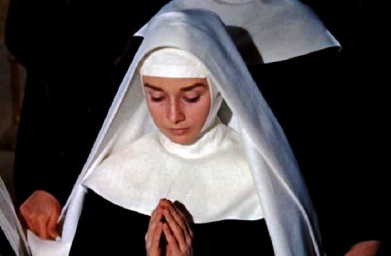 This 1959 film starring Audrey Hepburn is a rare example of Hollywood taking the rigors and struggles of religious faith seriously.
This 1959 film starring Audrey Hepburn is a rare example of Hollywood taking the rigors and struggles of religious faith seriously.
Religious stories go wrong in the movies so often, it’s enough to scare a filmmaker off the subject altogether. But one happy exception is The Nun’s Story from 1959, adapted from a best-seller by Kathryn Hulme, and directed by Fred Zinnemann. Audrey Hepburn plays Gabrielle, the daughter of a famous French surgeon, who becomes a nun in the 1930s and works as a surgeon’s assistant in the Congo. Hollywood has always presented such a wishy-washy image of Catholicism and nuns—see The Bells of St. Mary’s, for example—that the seriousness and craft of this film caught me by surprise.
The first third of the movie, which takes place in a convent, is especially good. The film patiently follows Gabrielle through each phase of her initiation into convent life. The pace is unhurried, the treatment is even-handed, and the effect is fascinating. Instead of the usual sugary sentimental music, the picture has a moody, and at times even ominous, score by Franz Waxman that reflects the real inner conflicts that would occur in the heart of someone attempting to devote herself to the rigors of a religious life.
It seems to me that this is the best work Audrey Hepburn ever did on screen. For once she is not an object of romance, but a complex character striving for meaning in her own life. She performs marvels in portraying a life that goes through quite a few different phases of growth and varying beliefs.
The Congo sequences don’t have quite the compelling interest of the earlier scenes in the convent. However, a very young Peter Finch is on hand as a rakish, unbelieving surgeon. How refreshing that his growing regard for Sister Luke (played by Hepburn) is only on the level of friendship—and no one tries to convert him, either. In fact, the film’s attitude towards belief is on the whole rather interesting in that it never becomes dogmatic on either side, only caring to present the nun’s inner struggle clearly.
This was a big studio production, by one of the most highly regarded directors in the industry—Zinnemann was of course the man who had made High Noon and From Here to Eternity. The Nun’s Story was critically acclaimed, although it got swept by Ben-Hur at the Oscars that year, and it did well at the box office. But for some reason, it’s not that well known any more. I know of few films that so beautifully depict someone’s inward progress as a person, without being at all dull. And the ending, the final scene, is one of the masterpieces of cinema, perfectly restrained, without any music, and emotionally stunning. One can only say, “Bravo.”
The Nun’s Story is available on DVD.

The matter-of-fact depiction of the family life of the commandant of Auschwitz conveys our horrifying capacity of living with and condoning the greatest evil....

Don McKellar’s dry comedy from 1998 examines the peculiar ways that people might cope when faced with the ultimate disaster: the end of planet...

Jean Gabin plays a famous jewel thief hiding in the Casbah, a criminal neighborhood in Algiers, in this popular French film from 1937. For...